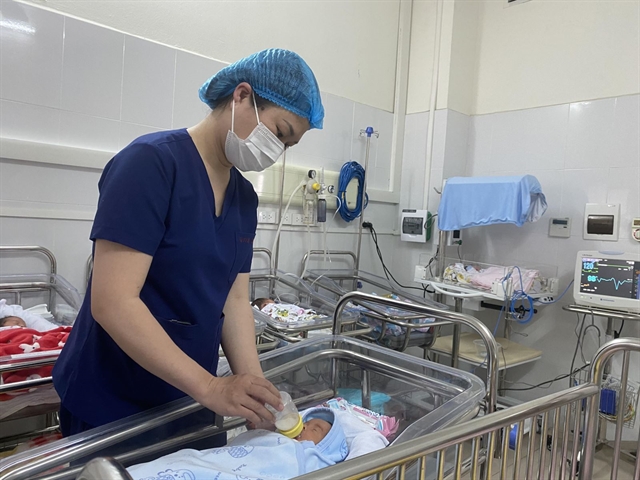 Society
Society

After bathing a newborn, Nguyễn Huyền Trang puts the baby in a warm blanket and feeds her with a small milk bottle. This is just one of the extra tasks that Trang and her colleagues must do every day to care for children born to COVID-positive mothers.

|
| Nguyễn Huyền Trang, a nurse from the Paediatric Department at the National Hospital for Tropical Diseases, feeds a new-born. — VNA/VNS Tạ Nguyên |
HÀ NỘI — After bathing a new-born, Nguyễn Huyền Trang puts the baby in a warm blanket and feeds her with a small milk bottle. This is just one of the extra tasks that Trang and her colleagues must do every day to care for children born to COVID-positive mothers.
For these babies, the nurses at the Paediatric Department of the National Hospital for Tropical Diseases in Hà Nội must become 'special mothers', caring for them in the early days of their life.
"We often call the babies by their mother's name. They were all born by caesarean delivery and their mothers can't name them yet," Trang told Tin Tức (News) online newspaper.
“As the number of COVID-19 cases in the community increased, cases of pregnant women with severe COVID-19 have also increased. When pregnant women with severe COVID-19 require surgery, we have to be on duty to immediately care for the new-borns."
"These children are often COVID-negative, but they still have to be monitored and tested for any health developments and so they learn to eat, little by little," Trang said.
Most babies are closely monitored because they were born prematurely, a result of their mother's severe COVID-19 infections.
The hospital's Paediatrics Department is currently caring for eight babies, including two premature and low birth weight babies who need to be incubated, and a child with respiratory failure.
The work of the nurses is very hard because they have to monitor and take care of the babies around the clock.
"We feed premature babies every hour. For babies born at full term, they are fed every two hours," nurse Nguyễn Thị Truyền said.
"With so much work, we are busy all day and our clothes are soaked with sweat."
Truyền said nurses on duty must monitor and care for as many as nine or ten children, leaving them with no time to rest.
"Not all babies eat well and sleep well, many cry day and night. Some are monitored by machine, so we have to constantly pay attention and handle any unusual symptoms," said Truyền.
.jpg)
|
| Nurses take care of newborn babies. — VNA/VNS Photo Tạ Nguyên |
Sometimes, a crying baby can make all the other babies cry, making 'mothers' really confused. Nurses have to quickly feed and coax the child to sleep.
"With such long shifts throughout the night, we are also very tired. I just hope the pandemic is over soon so we can rest," Truyền said.
For over two months, nurses have been working around the clock.
They are determined to stay at the hospital to fight against the pandemic and take the best care of their patients and babies.
“Each child is a special situation. They have not been close to the warmth of their mother since they were born. These children are still waiting for a hug from their mother, mothers who are still on ventilation," Trang said.
Most of the children are taken home by relatives when they are in stable health.
"We always try to take care of the babies as much as possible, to make up for the lack of warmth from their mothers in the days after their birth," Trang said.
The joy and motivation of the nurses is to see the babies grow in health day by day and go home to their families.
During the pandemic, some nurses' families have even stepped in to care for their children, allowing the nurses to stay focused on their normal hospital duties.
They can only go home for a week, after being on duty for two months.
"During the days at the hospital, I can't help my relatives when they have COVID-19. I worry for them, but can only encourage and guide them on how to take care of themselves and prevent infection," Truyền said.
"That's the work of health workers. During the pandemic, we have to try. No one can replace us." — VNS




